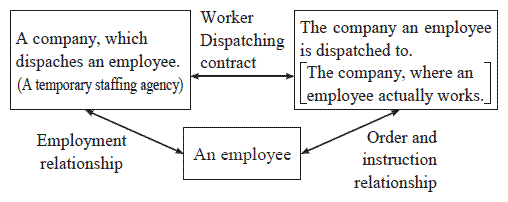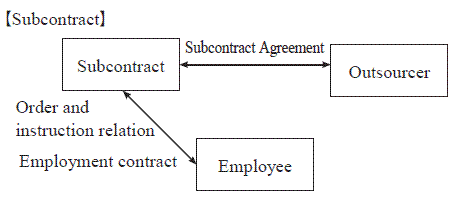1. Public Employment Security Offices
2. Fee-Charging Employment Placement Projects
3. Worker Dispatching Projects
1. Public Employment Security Offices
The public employment security office is administered under the Japanese government to provide advice and information on job placement. Nowadays, all public employment security offices in Japan are in communication through a computer network. Information on companies and job offers can be looked up on any computer. The latest job information and employment information is provided. If you understand Japanese, please stop by the nearest public employment security office.
Some Public Employment Offices provide advice
for foreign job seekers by means of interpretation service in some foreign
languages. The “Employment Service Centre for Foreigners” provides job
information, counseling and placement to foreign students and those other
foreigners who have specialized knowledge and skills.“ Tokyo Employment
Service Centre for Foreigners of Japanese Ancestry” offers job counseling
and placement to workers of Japanese ancestry.
In order to work in Japan, you must have
a status of residence that allows you to work, or a permit for extra status
activities.
2. Fee-Charging Employment Placement Projects
In principle, non - governmental employment placement organization, except
schools, are not allowed to help people find employment. Some non - governmental
agencies are permitted by the Minister of Health, Labor and Welfare to
provide a job placement service with a fee. However, non ? governmental
employment placement for construction industry and harbor transport industry
is not permitted . .
3. Worker Dispatching Projects
Worker dispatching means that an agent dispatches an employee, whom the agent employs as its own company staff, to another company with which a worker dispatching contract has been agreed. The dispatched employee works at the designated company under the order or instruction of that company. The Worker Dispatching Law” is legislated for the purpose of the protection and the stability of employment for dispatched workers. Labor laws and regulations, i.e. Labor Standards Law and others, are naturally applicable even to dispatched workers.
Only agencies which report to or are licensed
by the Minister of Health, Labor and Welfare, are allowed to carry on worker
dispatching undertakings. (Article 5 and 6, Worker Dispatching Law)

Temporary staffing agencies/companies are
allowed to dispatch staff to any business fields other than harbor transport,
constructions, security, and health care. (With regard to the health care
industry, it is allowed to have temporary staff only if the staff is dispatched
on the premise that he/she will be employed by the same company after the
contract period expires). In other words, it is against the law for so-called
brokers to outsource people as unskilled-labor to construction sites, etc.
When concluding a contract with temping staff/employee,
a temporary staffing company must clearly indicate matters involving duty,
location of work, temping period, pay, retirement, and so on, in writing.
A maximum period of employment for temporary
staff is designated for each field of work.

(1) Obligations in offering an employment contract
A. Occupations with restricted hiring span for temporary
employees(above occupations(1)a、g.)
Companies desiring to continue to hire temporary staff after the legally designated period must request the individual to agree to make an employment contract no later than the day required by law. Please ask Jukyu-chosei Jigyobu (Demand and Supply Coordination Division) of the Tokyo Labor Bureau (tel. 03-3452-1471) for details of the business fields above.
B. Occupations with no restricted hiring span for temporary
employees (above occupations (1) b. through f.)
When a company which has hired the same temporary employee for the same job for more than 3 years, and which plans to hire a new employee to the post, it must request to close an employment contract to the dispatched employee.
The original 26 businesses fields for Worker Dispatching.
a. Software development and maintenance
b. Machinery design
c. Operation of broadcasting machinery and tools, etc.
d. Production of broadcasting, etc.
e. Operation of office machinery and tools (operation of electronic computers and typewriters, etc.)
f. Interpretation, translation and shorthand work
g. Secretarial work
h. Filing (adjustment of documlnts and magnetic tapes, etc.)
i. Research (planning, operation and analysis of market research)
j. Financilal management (making account books and final accounts
documents)
k.. Writing business letters
l.. Demonstrations
m. Conducting
n. Cleaning buildings
o. Building facilities' operation, examination and completion
p. General information, reception and car parking lot attendance
q. Research and development
r. Planning and forming of business operation systems
s. Producing and editing books, etc.
t. Advertising design
u. Interior planning
v. Announcers
w OA instruction
x Tele -marketing business
w. Sales engineer's busin
z. Supplying and producing broadcasting scenery and property
Please ask for more details of the above
business fields at the Tokyo Labor Bureau Office which oversees the worker
dispatching undertakings.
(2) Dispatching Temporary Staff and Subcontracting
Subcontracting system can be easily confused
with the dispatching of temporary staff. In a subcontracting process, a
subcontractor closes a deal with a company to outsource a job. The subcontractor
directs and commands its employees in order to complete the job as its
own responsibility. In a subcontracting system, subcontractors give instructions
in regard to performance of duties and management of working hours, et
cetera themselves, unlike temporary staffing.
 
|